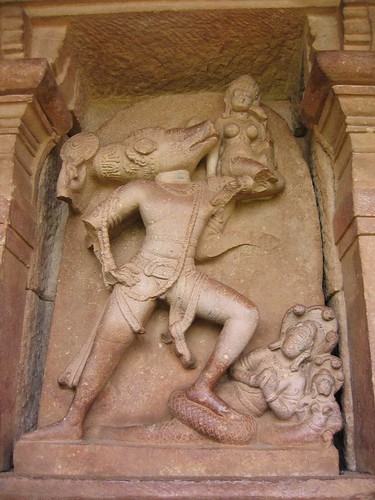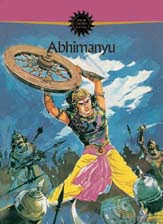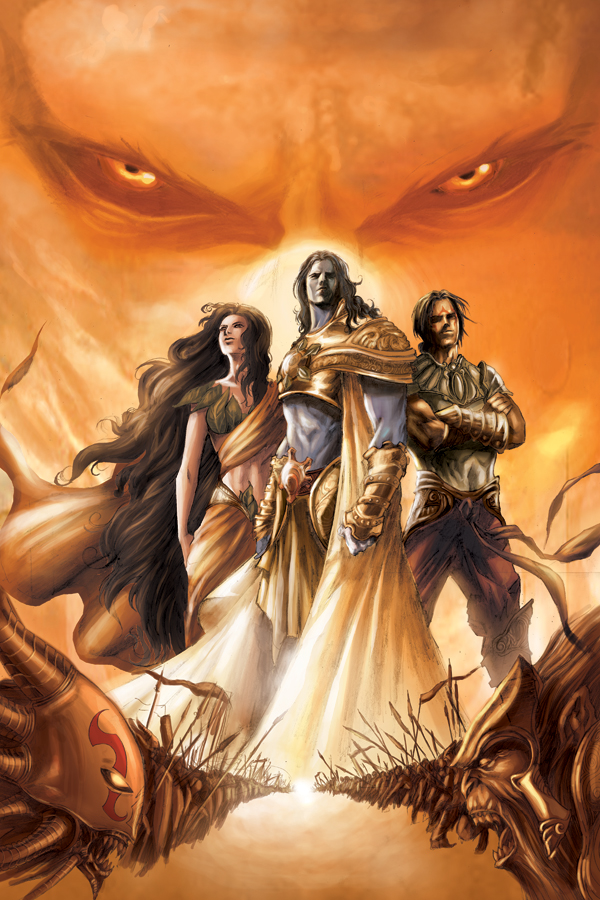RamaY wrote:Vali's killing is a puzzle from the viewpoint of imperial politics and dharma. Hence Vali questions logically about it, even at his dying stage. The questions are as below:
1] By killing one who is facing away, what worth is achieved by you?; 2] You have not punished the wrongdoer; 3] Killed one who is combating with another and an unvigilant one; 4] In your country or city I did no misdeed; 5] Non-guilty being is hurt; 6] Fruits, tuber eating being is killed; 7] No dispute of land, gold or silver; 8] You primary aspiration is to kill without probing into good or bad; 9] How do you face criticism by scholars?; 10] Unnecessary killers are hell-goers; 11] Un-wearable is my skin uneatable is my flesh; 12] Five kinds of five-nailed animals are usable by humans; 13] I would have brought back Maithili in one day.
For all these questions Rama answers in next chapter and speaks as to how justified is this elimination, to Vali and to all of us.
Source:
http://www.valmikiramayan.net/kishkindh ... _frame.htm
The Answer
1."Realise this reason by which I have eliminated you… you misbehaved with your brother's wife, forsaking the perpetual tradition. [4-18-18]
With this one and only reason Rama suffices all the thirteen questions of Vali, as summarised in endnote of last chapter. Beyond this Rama also answers other paltry questions, later.
2."While the great-souled Sugreeva is still alive, you with your habit of sinful acts have lustily misbehaved with Sugreeva's wife Ruma, who should be counted as your daughter-in-law. [4-18-19]
Vali being a king, he committed incest transgressing tradition. v˜lŸ t˜vat sva r˜jye sthitv˜ dharm˜ti kramam k®tav˜n | dharma d¨ÿaka× ca r˜j˜ avaþyam daõýanŸya× | dharm˜k¨tam This is the very fault found by Rama when expressing 'vaalii caaritra duuSakaH 'abuser of history/tradition...' in Kishkindha, 4-10-33.
3."Thereby, oh, vanara, this punishment is imposed on you, for your dissolute sinning in abusing your brother's wife, thereby for your transgression of tradition and virtue. [4-18-20]
Vali's question 10, 'inveterate killers are hell-goers...' is replied, 'killing a sinner is no sin and no hell is ensuing thereby...' is the reply, establishing Vali's sin.
4."I foresee no other kind of control other than punishment to him who conducts himself contrary to the society and who is deviant of conventions. [4-18-21]
Vali's question: 2] 'you are not punishing the wrongdoer...' is answered. saama daanam kSamaa dharmaH satyam dhR^iti 'influencing, largesse, forbearance, probity, candour' etc., will work with kings of equal status and worthiness in political strategies. But you are an inferior with an immodest conduct. Then, why should I waste that much of political manoeuvre in your regard? Thus you are eliminated straightaway...' Vali may counter Rama in asking for a lesser punishment than killing, like exiling etc., which he has given to Sugreeva. For this Rama is ready to say that no other punishment is evident than the one said by Manu: sapiõý˜patya d˜reÿu (reta× siktv˜) pr˜õa ty˜go vidhŸyate - - manu sm®ti .
5."My association with Sugreeva is as good as that with Lakshmana, nevertheless it betided with an understanding to regain Sugreeva's wife and kingdom, and he will give succour to me. [4-18-26]
Vali's question 13] 'I would have brought back Maithili in one day...' is given an answer. Bringing Maithili from the captivity of Ravana would have averted Vali's death - so Vali thought. But who will bring Ruma, wife of Sugreeva, and give her back to Sugreeva? Vali does not consider this, and in this alone Vali's transgression is said to have been proved. Thus any truce between Vali and Rama is an impossible and improbable proposition.
What all Rama wanted is the 'search for Seetha...' not bring her to his fore. Elimination of Ravana is to be done by Rama alone, for which Seetha is to be located first. If a truce is struck between Vali and Rama, Vali straightway goes to Ravana and asks for Seetha. If Ravana yields Seetha there is no cause left for his elimination. Ravana for sure refuses to yield her. Then a combat ensues between Ravana and Vali. But Vali can combat one-to-one in a duel and he may not encounter a magical war of Indrajit or Kumbhakarna. Then all the demons will combine to eliminate Vali, thus the epic concludes there haphazardly. Other way round, if Vali seeks help of Ravana and his military to combat Rama, Vali's forces and Ravana's forces will come down on a handful warriors like Rama, Sugreeva Hanuma, and Jambavanta et al. Then the whole of monkey force will be with Vali, and these few warriors will be routed down mercilessly. Above all, Rama has promised Sugreeva to eliminate Vali, the abuser of tradition, and Rama becomes blameworthy if he fails in his word. Hence the simplest formula 'enemy's friend is my enemy too...' works well and Rama followed that only.
6."I gave a promise to Sugreeva at the time of befriending him in the presence of vanara-s, and how is it possible for my kind to dishonour a given promise? [4-18-27]
In Aranya Kanda he tells Seetha, that he even leaves his life than to feign his promise. api aham jiivitam jahyaam tvaam vaa siite sa lakSmaNaam || 4-10-18. Hence there is no question of his going back on the word given to them that crave for his mercy.
7."When a renouncer has committed sin like that of the one committed by you, my venerable ancestor Maandhaata has given punishment which he desired. [4-18-33]
This is according to the meaning derived by ancient commentators which doe not go well with the import of earlier verse 'the king derives the blot if he does not punish properly' or with the next one. Rama's ancestor Maandhaata should have got that blot for not punishing a renouncer in proper way. Other mms has this verse like this: puurveNa mama maandhaataa sampraaptam vyasanam mahat | shramaNena kR^ite paape yathaa paapam kR^itam tvayaa || And which verse is to be kept, it is up to the pundits.
Rama is quoting a precedent from his own dynasty. Maandhaata has to impose capital punishment to a sage, for that sage committed some immoral act. Here also the shramaNa is used for a wandering sage, called yati. Because he is religious person is he to let off; a religious person's sinning is doubly punishable; are the problems of Maandhaata. This word shramaNa yati, need not be equated with a Buddhist monk, for they also have same titles, and Maandhaata is said to have existed long before Buddha's era.
8.Such sin is acquired even by other kings who are unobservant in imposing proper punishment, and those kings had to make amends for it at appropriate time, by that propitiation they used to mitigate that filth of that sin. [4-18-34]
The kings who are otherwise busy may not hanker after thieves and sinners always, thus they become unobservant of each and every individual's behaviour. So the kings used to make amends at appropriate time. It is up to the individual to comport properly or improperly. An offender may escape hundred offences, but if caught once, he has to pay for all his wrongdoings.
9."Thereby, enough with your annoyance, oh, tigerly vanara, as your elimination is devised righteously, and we too are not independent. [4-18-35]
They are bound by duty. They are not at their free will to act on their own whims and fancies. Vali's question: 9] 'How do you face criticism by scholars?' is answered. ' None can criticise because I have not acted on my own, but bound by scriptures and precedents...' y˜ v˜ na vadhasya vadhe t˜v˜n vadhasya mokÿõe | adharmo n®pate× d®ÿ÷o dharmastu viniyacchata× - manu sm®ti 9-249 'How much sin is acquired by executing a murderer, that much sin is acquired by executing a non-murderer...' which again is somewhat similar to the present day saying, 'let hundred criminals go unpunished, but let no innocent be punished.'
10."I have neither angst nor ire in this matter of my eliminating you, or, your reviling me, oh, best monkey, but listen to the other point I wish to make clear. People will be capturing several animals, either covertly or overtly, with snares, springes and even with numerous contrivances. [4-18-37, 38a]
So far Rama replied Vali with a view that Vanara-s are a species of Vedic-beings who hold fast to Vedic duties like sandhyaa vandana, suuryopasthaana performed by Vali, and swasthyana performed by Tara, and the other their daily routines of Veda-s. But Vali takes a U-turn declaring himself an animal and asks: 6] Why fruits, tubers eating being is killed; 11] Un-wearable is my skin uneatable is my flesh; 12] Five kinds of five-nailed animals are usable by humans...' Rama started to tell how humans deal with animals, should Vali declare himself an animal, if not a specific Vedic-being.
11."In this world even the kingly sages well-versed in virtue will go on hunting, and hunting is no face to face game, as such, oh, vanara, therefore I felled you in combat with my arrow because you are a tree-branch animal, whether you are not combating with me or combating against me. [4-18-40]
'Whether you face this way or that you are an animal, as you alone said, besides being an enemy of my friend...' For this Griffith says - I cannot understand how Valmiki could put such an excuse as this into Rama's mouth. Rama with all solemn ceremony, has made a league of alliance with Vali's younger brother whom he regards as a dear friend and almost as an equal, and now he winds up his reasons for killing Vali by coolly saying: 'Besides you are only a monkey, you know, after all, and as such I have every right to kill you how, when, and where I like.'
12."I am abiding by the ethicalness practised by my father and forefathers, but you revile me without the knowledge of rightness, just by clinging to your rancour." Thus said Rama to dying Vali. [4-18-43]
There is none to say that Vali is 'unkillable...' or 'not to be killed...' But to every one a doubt occurs as to why Rama did not come face to face with and killed him? Why hit him from a remote place? For these doubts, the above said arguments may not suffice or satisfactory, either to Vali or to us, the readers. Dharmaakuutam, the only commentary on Ramayana insofar as dharma is concerned explains that for us.
When it is said by Rama that 'today only I will kill Vali...' then it may be countered by saying, 'then why killing him from distance, why not confront him?' If Rama comes to fore, fear may grip Vali, then he may take Ruma, Sugreeva's wife, and to insult, Sugreeva further, Vali may go to a distant place with her. Or, he may seek shelter with Ravana. Or, he may even take refuge in Rama like Sugreeva. Or, on seeing Sugreeva with enough support, he may summon all his Vanara army to fight with Sugreeva and his supporters. Then it will prolong for a time. Then the promise of Rama made to Sugreeva to accord his wife and his kingdom by killing Vali, also prolongs. Justice delayed is denied. Otherwise, if Vali surrenders to Rama, as the killing of a refugee is not a merited act, Rama has to pardon Vali. Whether Vali takes refuse or not, killing Vali on that day itself, and establishing Sugreeva in Kishkindha are the promises made by Rama, at the time of befriending Sugreeva. The word given is to be kept up. So Rama did it and there is no unrighteous deed done by Rama. And Vali also accepts this in the coming stanzas.
After Rama’s Reply
That lord of vanara-s then replied Rama with adjoined palms, "oh, best one among men, what all you have said is that way proper, undoubtedly. [4-18-45]
Indeed an ignoble cannot disprove a nobleman, Raghava, and with regards to the undesirable and improper words I have unwittingly spoken earlier, in that mater too it will be truly unapt of you to make me blameworthy, as I spoke them in anguish and ignorance. [4-18-46, 47a]
Oh, Rama, the knower of probity, I am the one who digressed from the rightness and a forerunner among such transgressors, such as I am, give absolution even to me with words abounded with rightness." Vali is thus saying to Rama. [4-18-48]
He is boyish, juvenile, and the only dear son of mine, oh, Rama, as such that great-mighty son of Tara needs your protection. [4-18-52]
Oh, lord of men, it will be apt of you to show the same kind of outlook towards Sugreeva, oh, king, even towards Angada, which you have for Bharata and Lakshmana. [4-18-54]
The fault occurring from my fault of maltreating Sugreeva may not light upon that self-reproachful Tara, and it will be apt of you to see that Sugreeva will not look down on her treating her as the wife his rival. [4-18-55]
Oh, lord, oh, tremendously braving one, oh, Rama, the lord of people, I blamed you when your arrow sweltered and rendered me imbecile, thus I blamed you unthinkingly for which I may please be pardoned, I appease you for the same. [4-18-66]





